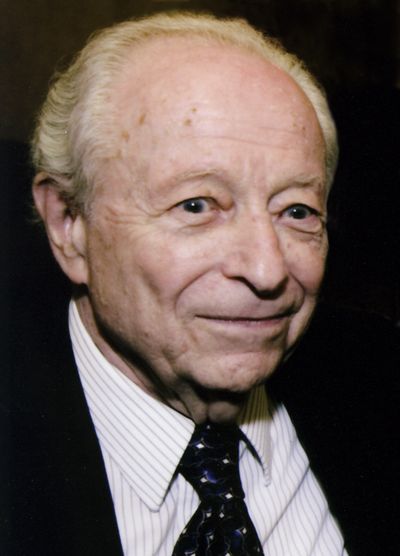Neoconservative icon Irving Kristol, 89, dies
One-time leftist was ‘mugged by reality’

WASHINGTON – Irving Kristol, the writer, editor and publisher known as the godfather of neoconservatism whose youthful radicalism evolved into a historic rejection of communism, liberalism and the counterculture, died Friday.
Kristol, 89, died of complications from lung cancer.
Kristol was the husband of critic-historian Gertrude Himmelfarb and father of neoconservative editor and commentator William Kristol, an editor of the Weekly Standard.
A Trotskyist in the 1930s, Kristol would soon sour on socialism, break from liberalism after the rise of the New Left in the 1960s and in the 1970s commit the unthinkable: support the Republican Party, once as “foreign to me as attending a Catholic Mass.”
He was a New York intellectual who left home, first politically, then physically, moving to Washington in 1988. He was a liberal “mugged by reality,” his turn to the right joined by countless others, including such future GOP Cabinet officials as Jeane Kirkpatrick and William Bennett and another neoconservative founder, Norman Podhoretz.
“The influence of Irving Kristol’s ideas has been one of the most important factors in reshaping the American climate of opinion over the past 40 years,” Podhoretz said.
He was a flagship in the network of think tanks, media outlets and corporations that helped make conservatism a reigning ideology for at least two decades, the “vast right-wing conspiracy” that Hillary Rodham Clinton would claim was out to get her husband.
Former Vice President Dick Cheney was a longtime admirer and former President George W. Bush, whose administration was heavily populated by neoconservatives, awarded Kristol a Presidential Medal of Freedom in 2002, praising him as “a wide-ranging thinker whose writings have helped transform America’s political landscape.”
Kristol himself would regard neoconservatism as a job well done, a “generational phenomenon” that was “pretty much absorbed into a larger, more comprehensive conservatism.” But the Iraq war and the poor economy badly damaged the right’s unity and credibility over the past few years.
Active in publishing for more than half a century, Kristol wrote essays and reviews for The New Leader and Commentary; released several books, including “Neo-Conservatism: The Autobiography of An Idea,” and co-founded a seminal neoconservative journal, The Public Interest.
He was a contributor to the Wall Street Journal, writing a series of essays in the 1970s that called on businesses to invest in conservative scholarship and counter the “permanent brain trust” of liberal politics.
With funding from Joseph Coors, Richard Mellon Scaife and others, the right created such think tanks as the Heritage Foundation. Kristol himself was a fellow at a key think tank, the American Enterprise Institute.